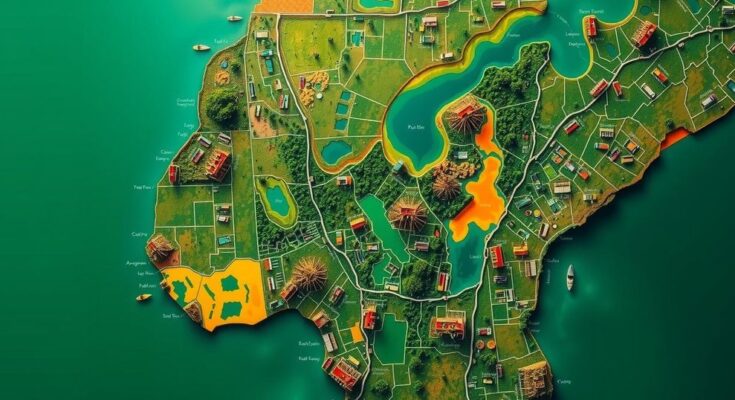Guinea-Bissau is urged to strengthen its institutional and financial systems to enhance climate resilience, as emphasized in the Country Climate and Development Report (CCDR). The country faces significant development challenges, including high poverty, political instability, and economic dependency on cashews, with climate change threatening vulnerable communities. Good governance and a favorable business environment are critical for sustainable growth. Immediate priorities include adopting climate-smart agriculture and improving energy access.
Guinea-Bissau must enhance its institutional and financial systems to bolster climate resilience and achieve sustainable development, as highlighted in the recent Country Climate and Development Report (CCDR). Although the nation possesses the highest per capita natural capital in West Africa, it grapples with severe development hurdles, including widespread poverty, political turmoil, and economic dependency on cashew nuts. Furthermore, it has one of the lowest rates of electricity access across the region, and these challenges are exacerbated by climate change, which disproportionately affects vulnerable populations in coastal areas and those reliant on agriculture and fisheries. Without appropriate adaptation measures, climate-related risks have the potential to deepen poverty and threaten progress. Key to the nation’s sustainable growth is good governance, political stability, and an enabling business environment. “The Country Climate and Development Report provides Guinea-Bissau with a strategic framework to align development goals with climate action, promoting positive transformations and sustainable growth,” stated Rosa Brito, the World Bank Group Resident Representative in Guinea-Bissau. Considering the country’s abundant natural resources, the report is especially crucial given its high susceptibility to climate shocks. An all-encompassing strategy to tackle climate vulnerability encompasses the enhancement of governance, diversification of the economy, preservation of natural capital, development of human resources, and investments in sustainable agriculture and infrastructure. The CCDR outlines immediate action points over the next three years that include implementing climate-smart agricultural practices, protecting and regenerating forests, increasing energy access, and improving human capacity and knowledge systems. The alignment of climate initiatives with development objectives is vital for keeping Guinea-Bissau on a path toward meeting its ambitions for growth. Countries that rapidly develop and prosper will possess better capabilities to shield themselves from the adverse effects of climate change. Hence, fostering robust, sustainable, and equitable growth is paramount for Guinea-Bissau to effectively confront the global climate crisis.
Guinea-Bissau is a West African country that, despite its rich natural resources, endures substantial development challenges, including high poverty levels, political instability, and a narrow economic base overly reliant on a single agricultural commodity, cashew nuts. The impact of climate change poses significant risks, particularly to vulnerable demographics within the nation, such as those living in low-lying coastal regions or relying on agriculture and fisheries. The government recognizes that without proper adaptation and innovative solutions, these challenges could exacerbate existing poverty, making resilience against climate impacts an urgent priority.
In conclusion, the Country Climate and Development Report emphasizes that for Guinea-Bissau to navigate its economic and environmental challenges successfully, it must focus on enhancing governance and diversifying its economy. With proper strategies to implement climate-smart practices and develop infrastructure sustainably, the country can secure a better future for its vulnerable populations and align its growth with climate resilience. This comprehensive approach will not only address immediate environmental threats but will also contribute to achieving long-term development objectives.
Original Source: www.miragenews.com




